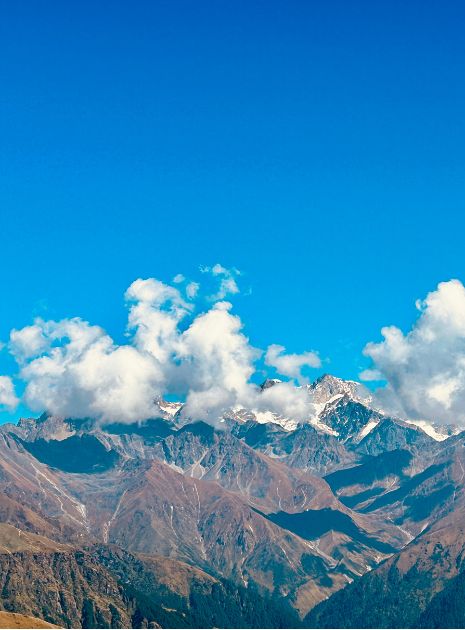Chinyali Saur
Most places in Uttarkashi cling to steep slopes. Chinyali Saur (चिन्यालीसौर) is different. It rests on a flat patch of land, the “सौर” meaning plain, stretched out beside the Bhagirathi. Life here feels open the hills still guard the edges, but the center gives you room to breathe.
Most places in Uttarkashi cling to steep slopes. Chinyali Saur (चिन्यालीसौर) is different. It rests on a flat patch of land, the “सौर” meaning plain, stretched out beside the Bhagirathi. Life here feels open the hills still guard the edges, but the center gives you room to breathe.
Census figures say the block has close to 50,000 people, spread across a little under 5,000 households. All of them rural, none counted as urban. On paper, Chinyali Saur is a tehsil headquarters, one of the connectors between the mountains and the plains.
But walk its lanes and you see the details statistics miss: a farmer resting against his plough, schoolchildren giggling as they cross irrigation channels, women balancing brass pots of water while gossip travels faster than their steps.
The land here is fertile because the Bhagirathi and its smaller canals feed it. Fields of paddy (धान), wheat (गेहूँ), and potatoes (आलू) spread where the ground allows. Millet patches cling to slopes, and fodder grass stacks in bundles along rooftops.
Farming is still the basis of life. Men lean on their hoes at dusk, women return with baskets of greens, and cattle bells echo in the narrow gullies. The soil gives, but not without demand monsoon floods can wash away months of work, winters bite hard, and summers leave fields thirsty. “मेहनत पर ही आस टिकी है” (Only hard work keeps hope alive), a farmer says, pouring tea into a cracked steel tumbler.
Chinyali Saur is more than fields. Being a tehsil has pulled schools and institutions into its fold an ITI, a polytechnic, a degree college, and convent schools like Mary Mata. Parents see education as the bridge out of struggle. Boys travel to Dehradun for higher studies, and some girls also do so if their families are willing to support them.
Morning scenes show it clearly: children in uniforms walking in groups, bags heavier than their shoulders, sometimes hopping onto jeeps heading toward the highway. In their chatter, dreams mix with homework doctor, engineer, teacher, soldier.
Hindi handles most transactions, but Garhwali (गढ़वाली) carries the warmth of belonging. Weddings bring folk songs that rise into the night, women’s voices sharp and strong. Children switch easily between Hindi at school and Garhwali at home. Truck drivers passing through add Punjabi phrases; mobile ringtones bring Bollywood songs into the mix.
This weaving of tongues keeps the place alive in sound as much as in sight.
Temples and mosques share the town’s rhythm. Aarti (आरती) bells ring at dusk, azaan rolls through the air, and no one finds the sounds out of place. Festivals keep traditions rooted.
During Navratri (नवरात्रि), small melas (मेले) fill open grounds with stalls, drums, and children chasing toys. Diwali (दीवाली) lighting fixtures terraces with rows of diyas, their reflections glinting in the river. Holi (होली) colorations splash throughout lanes until even elders giggle like kids. Faith here is more about gathering than grand rituals eating together, singing together, remembering together.
Chinyali Saur isn’t cut off. The highway brings buses and jeeps from Dehradun. Goods move in and out, and with them, ideas. There’s even an airport on the edge of town Chinyali Saur Airport used more by the Air Force than by regular passengers, but still a mark of connection.
Yet, the basics aren’t smooth. Roads crack in the rain, electricity flickers, and health centers don’t always have the medicines people need. Jobs beyond farming are scarce. Many young men migrate to cities for work, returning only for weddings or festivals. Women often hold the heavier burden fields, homes, children without much recognition.
What holds Chinyali Saur steady is the quiet strength of its people. A farmer mends his plough, knowing tomorrow will ask more of him. A mother pushes her daughter to study further, even if it means going against old norms. A group of men at the tea stall jokes about politics, but still plans together for irrigation repairs.
If you sit by the Bhagirathi at dusk, you’ll see it in small details: boys skipping stones into the river, girls carrying schoolbags bigger than their backs, elders sitting quietly with the weight of years on their shoulders.
Chinyali Saur doesn’t claim importance. It doesn’t rush. But in its flat plain between the mountains, it shows what it means to survive and belong to the land, to each other, to a rhythm that’s steady and strong.

Uttarakhand is not simply another country. People here name it Devbhoomi (देवभूमि), the Land of the Gods. And it feels that way. Rivers begin right he......
See Details